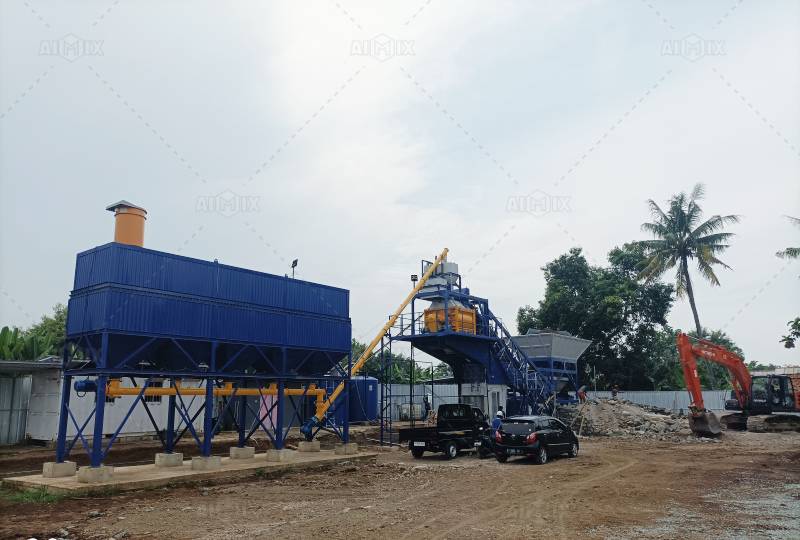The construction industry is undergoing a transformation toward sustainability, efficiency, and waste reduction. At the core of this shift is the adoption of mobile batching plants, which are redefining how concrete is produced and delivered. Beyond their flexibility and cost-effectiveness, these plants play a vital role in supporting the circular economy — a system focused on minimizing waste, reusing materials, and optimizing resource cycles. Whether it’s in South Africa, Australia, or regions seeking affordable solutions at competitive harga batching plant mobile, these units are becoming the backbone of greener construction practices.

Understanding the Circular Economy in Construction
The traditional linear construction model — “take, make, and dispose” — has resulted in significant resource waste and environmental pressure. The circular economy aims to close this loop by reusing materials, recycling concrete waste, and designing for longevity.
In concrete production, this approach involves:
-
Using recycled aggregates and supplementary cementitious materials such as fly ash and slag.
-
Reducing water and energy consumption during batching.
-
Implementing modular and mobile equipment to minimize transportation emissions and on-site waste.
Here, mobile batching plants serve as a technological enabler, helping contractors align daily operations with sustainability principles.
How Mobile Batching Plants Support Circular Construction
Unlike stationary plants that require fixed installation and large energy inputs, mobile batching plants are designed for movement and efficiency. They can be transported and installed directly at or near the construction site, enabling localized production and reducing material transportation distances.
Here are several ways mobile batching plants integrate into the circular economy framework:
a. On-Site Production and Waste Reduction
Mobile plants eliminate the need to transport ready-mixed concrete over long distances. This minimizes concrete wastage caused by delays and temperature changes. Leftover concrete can also be recycled more efficiently on-site.
b. Energy and Fuel Efficiency
Modern units feature energy-efficient mixers, automated controls, and optimized engine systems, lowering the carbon footprint compared to traditional setups.
c. Resource Reuse and Recycling
Some advanced models allow the integration of reclaimed aggregates or water recycling systems, ensuring that waste materials from demolished structures can be reintegrated into new mixes.
d. Modular Design for Lifecycle Extension
Mobile batching plants are modular and serviceable, meaning parts can be replaced, upgraded, or reused in new setups. This design philosophy mirrors the circular principle of extending product lifespan.

Regional Applications: Global Movement Toward Mobility
The adoption of mobile batching plants is expanding across the world, with specific trends visible in key markets such as South Africa, Australia, and Southeast Asia.
a. Mobile Batching Plant South Africa: Building Infrastructure Sustainably
In South Africa, rapid infrastructure development across mining, road, and housing projects has fueled the rise of mobile solutions. Contractors prefer mobile batching plants for their ability to operate in remote areas and produce consistent-quality concrete without the need for permanent facilities.
Moreover, these units align with the country’s sustainability goals by reducing energy consumption and facilitating the use of locally sourced recycled materials.
b. Mobile Batching Plant for Sale Australia: Supporting Green Construction Goals
Australia’s construction industry is highly focused on sustainability and reducing construction waste. The growing market for mobile batching plants for sale Australia reflects this focus. These plants are widely used in infrastructure upgrades, mining sites, and regional projects where transport distances are long.
Their flexibility allows for on-demand concrete production, significantly reducing the need for return loads or disposal of excess concrete — both critical to circular construction efficiency.
c. Competitive Harga Batching Plant Mobile in Southeast Asia
In markets like Indonesia, Malaysia, and the Philippines, the competitive harga batching plant mobile (mobile batching plant price) is a key factor driving adoption. Contractors appreciate the cost advantage of owning compact, efficient plants that can be relocated across projects.
The affordability of these units, combined with their reduced operational costs, enables smaller contractors to participate in sustainable construction practices without large capital investment.
Economic and Environmental Benefits
The integration of mobile batching plants into circular economy models provides measurable benefits:
-
Reduced carbon emissions: On-site production minimizes concrete transportation.
-
Lower energy and water usage: Advanced recycling systems and energy-efficient engines reduce operational inputs.
-
Lower total project cost: Reduced waste and shorter transport distances lead to direct financial savings.
-
Faster project delivery: Rapid installation and mobility shorten setup time and boost productivity.
The long-term financial benefits often outweigh the initial purchase price, making mobile batching plants not just environmentally friendly but also economically sound.

Technological Advancements Driving the Shift
Modern mobile batching plants are equipped with automation and smart controls that optimize production cycles and resource management. Features such as remote monitoring, AI-based dosing accuracy, and data tracking make it easier to measure sustainability performance in real time.
Some manufacturers also integrate hybrid power systems and solar compatibility, further aligning concrete production with renewable energy strategies. These innovations not only enhance efficiency but also reinforce the environmental credentials of contractors adopting mobile systems.
The Road Ahead: Mobility as a Circular Solution
The shift toward mobility in concrete production is no longer just a trend — it’s a strategic direction that supports sustainable growth. Governments and private developers are increasingly including circular economy criteria in project tenders, making mobile batching plants an attractive investment.
In the coming years, innovations will likely focus on:
-
Full integration of recycled materials in on-site batching.
-
AI-driven resource optimization for zero-waste production.
-
Broader adoption of mobile batching plants in urban renewal and green infrastructure projects.
Conclusion
As the construction industry continues its journey toward circularity, mobile batching plants represent a powerful tool for achieving both environmental and economic sustainability. They enable localized, efficient, and flexible concrete production while minimizing resource waste and carbon emissions.
From the competitive harga batching plant mobile in Asia to the growing markets for mobile batching plant South Africa and mobile batching plant for sale Australia, one thing is clear: mobility is not just about convenience — it’s about closing the loop in modern construction.